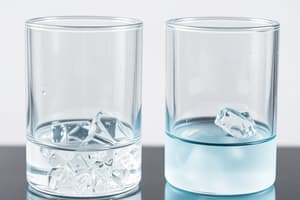Podcast
Questions and Answers
Which state of matter consists of ionized gases?
Which state of matter consists of ionized gases?
- Liquid
- Solid
- Plasma (correct)
- Gas
Which state of matter has particles that can slide around each other?
Which state of matter has particles that can slide around each other?
- Plasma
- Gas
- Solid
- Liquid (correct)
Which property of matter includes color and boiling point?
Which property of matter includes color and boiling point?
- Chemical properties
- Physical properties (correct)
- Atomic properties
- Molecular properties
What property describes how substances react with others to form new substances?
What property describes how substances react with others to form new substances?
Ice (solid) is less dense than water (liquid) due to:
Ice (solid) is less dense than water (liquid) due to:
What is the smallest unit of an element that retains the chemical properties of that element?
What is the smallest unit of an element that retains the chemical properties of that element?
In a synthesis reaction, what type of substances combine to form a more complex substance?
In a synthesis reaction, what type of substances combine to form a more complex substance?
Which physical property refers to a substance's resistance to scratching?
Which physical property refers to a substance's resistance to scratching?
What type of chemical bond holds the particles within molecules together?
What type of chemical bond holds the particles within molecules together?
Which property refers to the ability of a substance to catch fire and burn easily?
Which property refers to the ability of a substance to catch fire and burn easily?
What is the temperature at which a solid changes into a liquid known as?
What is the temperature at which a solid changes into a liquid known as?
Flashcards are hidden until you start studying
Study Notes
Matter: A Comprehensive Overview
Matter is all around us, making up everything from the air we breathe to the buildings we live in. Understanding matter and its properties forms the foundation of chemistry. Let's explore some fundamental aspects of matter, including its states, properties, atomic composition, chemical reactions, and physical characteristics.
States of Matter
Matter exists in four primary states: solid, liquid, gas, and plasma. Solids have a fixed shape and volume, with particles arranged in a specific pattern. Liquids also have a fixed volume but can flow, with particles closely packed together but able to slide around each other. Gases have no fixed shape or volume, and particles move freely, creating pressure. Plasmas are the fourth state of matter and consist of ionized gases, where electrons are no longer bound to atoms.
Properties of Matter
Properties of matter can be classified as physical or chemical. Physical properties include attributes such as color, boiling point, melting point, and density, which do not affect the composition of a substance. Chemical properties describe how substances react with others, forming new substances with different properties.
The physical state of matter impacts its properties. For example, ice (solid) is less dense than water (liquid), which is less dense than steam (gas). This relationship is known as the state of matter model.
Atoms and Molecules
The smallest unit of an element that retains the chemical properties of that element is called an atom. Elements are composed of one type of atom. Compounds are made up of atoms from different elements bonded together, forming molecules. The particles within molecules are held together by chemical bonds, which can be covalent, ionic, or metallic.
Chemical Reactions
Chemical reactions involve the rearrangement of atoms to form new compounds. These reactions can be classified as synthesis (combination), decomposition, or displacement. In a synthesis reaction, two or more simple substances combine to form a more complex substance. Decomposition reactions occur when a single substance breaks into two or more simpler substances. Displacement reactions involve the transfer of atoms from one substance to another.
Physical Properties
Physical properties of matter can be used to identify and classify substances. Here are some common physical properties:
- Color: The way matter appears to the human eye when viewed in white light.
- Odor: The smell produced by a substance.
- Taste: The flavor of a substance when it comes into contact with taste receptors in the mouth.
- Hardness: A substance's resistance to scratching.
- Density: The mass of a substance per unit volume.
- Melting Point: The temperature at which a solid changes into a liquid.
- Boiling Point: The temperature at which a liquid changes into a gas.
- Solubility: The ability of a substance to dissolve in a solvent.
- Flammability: How easily a substance catches fire and burns.
Understanding matter and its properties is essential for developing a foundation in chemistry and the physical sciences. These topics will provide the basis for exploring more advanced concepts in the future.
Studying That Suits You
Use AI to generate personalized quizzes and flashcards to suit your learning preferences.




